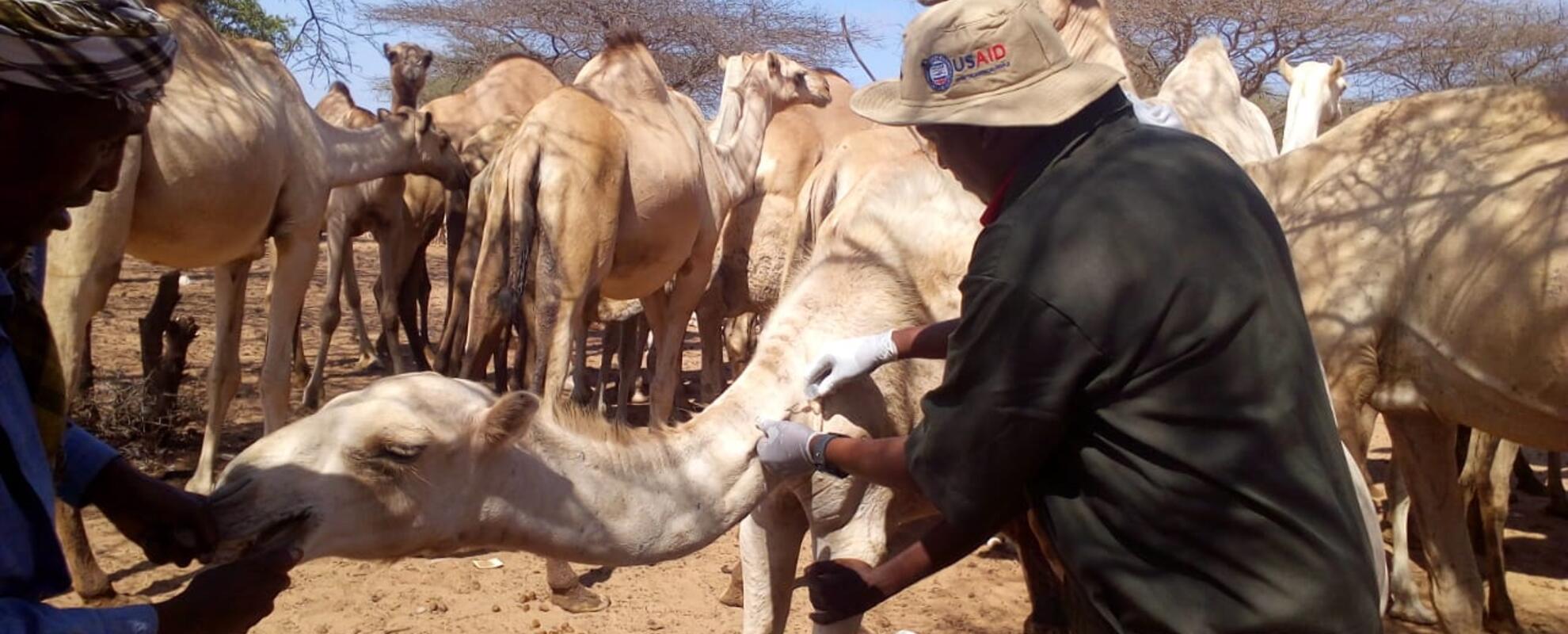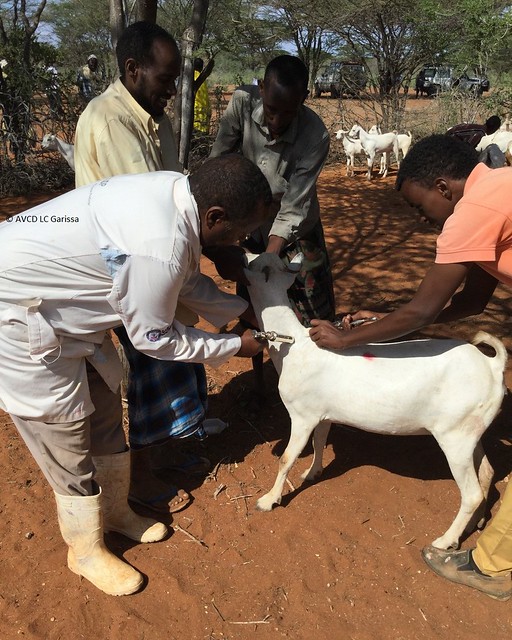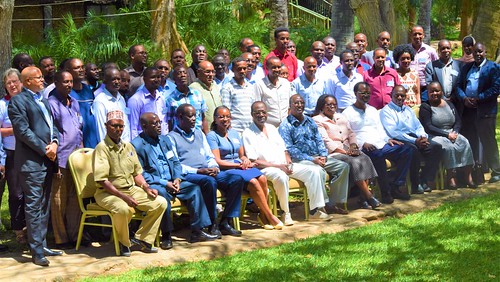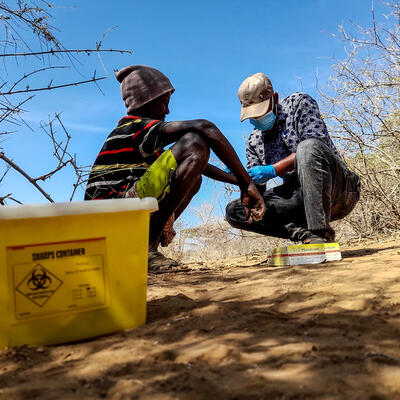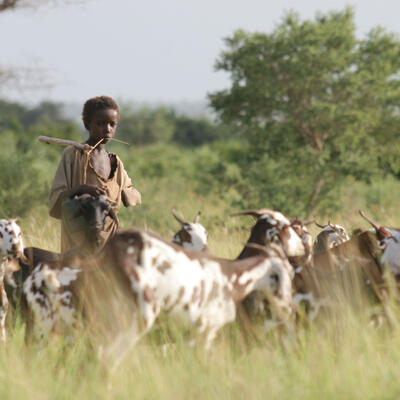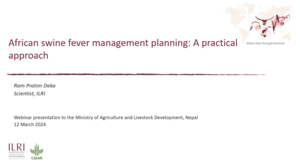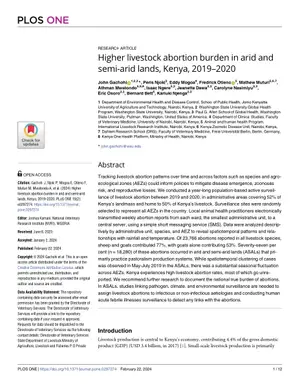
Can the private sector deliver livestock vaccines in Kenya? Yes, they can
A private service provider supported by the International Livestock Research Institute (ILRI) Accelerated Value Chains Development (AVCD) program’s livestock component, provides high-quality veterinary inputs and services to the farmers in Kenya’s arid areas (photo credit: ILRI/ Haret Hambe).
Livestock diseases and vectors are among the top constraints limiting the productivity and development of the livestock industry worldwide. They also significantly impact on human health and well-being. It is estimated that animal diseases are responsible for more than 20% of economic losses incurred globally, but the percentage could be higher in sub-Saharan Africa.
In Kenya, diseases are particularly severe in extensive livestock systems. In these regions, animal health service delivery is hampered by various factors, including the vast yet sparsely populated areas, nomadic way of life, poor infrastructure, insufficient technical personnel and lack of enabling policies and support structures.
Vaccines are the most effective intervention for reducing animal diseases, livestock deaths and improving human health. Even so, some current practices limit the scope of the private sector’s participation in vaccination, thus creating an unattractive business environment. For example, there exists a perception, among vaccine value chain actors that the current veterinary regulations restrict delivery of vaccines by the private sector.
An in-depth analysis of existing statutes by the Accelerated Value Chain Development (AVCD) Program at the International Livestock Research Institute (ILRI) revealed that this perception has no legal backing. Unfortunately, it has made pastoral livestock keepers to rely almost exclusively on the limited and often delayed public sector vaccination services. Consequently, there is widespread self-diagnosis and medication, abundance of counterfeit and substandard drugs and frequent outbreaks of livestock diseases.
However, this is set to change given the anticipated issuance of a circular by the director of veterinary services (DVS), clarifying that the private sector is allowed by law to deliver veterinary vaccines. The public sector recognizes that it does not have adequate resources or capacity to deliver all the animal health services needed to control livestock diseases adequately and thus welcomes participation of the private sector. It is expected that resolutions passed recently by livestock sector stakeholders in the country will guide future provision of animal health services in the nation.
Participants at a workshop in Isiolo that discussed animal health services in northern Kenya (photo credit: ILRI /Judy Kimani).
The resolutions were passed at a stakeholder workshop held in Isiolo, Kenya, on 18 July 2019. The meeting was organized by the DVS and facilitated by the ILRI AVCD Program together with the Kenya Investments Mechanism Program ___both funded by the United States Agency for International Development (USAID) Feed the Future Program. It was occasioned by recent findings made by the ILRI AVCD Program that animal health delivery in extensive systems is unprofitable partly because of restrictions in vaccine delivery by the private sector.
The ILRI AVCD Livestock Component supported the involvement of private actors in animal health service delivery in the ASALs (photo credit: ILRI/ Haret Hambe).
It emerged that most of the animal health delivery challenges experienced in the arid and semi-arid areas (ASALs) have been made worse by the very same people who ought to be providing solutions for livestock keepers. Poor policies on provision of animal health services such as the provision of free drugs and vaccines by the government and development partners have encouraged a non-sustainable dependence. By commercializing these services, community ownership and participation can ensure wider reach and encourage private sector actors to invest in delivery of the much-needed services. Additionally, public animal health officers were reported to be misinterpreting the law and regulations on the delivery of vaccines by the private sector either due to ignorance or for personal interests. Rampant supply of counterfeit and substandard drugs encouraged by existence of uncontrolled borders and the low capacity of the recently created Veterinary Medicines Directorate leading to infrequent inspections has further discouraged private sector investment.
Representatives of the public and private sectors signed the resolutions (photo credit: ILRI /Judy Kimani).
The stakeholders committed to implement the following eight resolutions that were arrived at, offering solutions that will guide future practice and encourage private sector investment in animal health service delivery:
- Cooperate and consult, at all times, on matters of animal disease and pest control.
- Actively encourage private sector investment in animal health services and work with the private sector in animal health service delivery and remove any barriers to delivery of animal health services including vaccinations by the private sector.
- Abide by relevant national, regional and international laws, treaties, protocols and standards; especially the World Organisation for Animal Health (OIE) standards, which are ratified by Kenya.
- Stop delivery of free veterinary medicines and vaccines except for those that the government has declared for eradication and emergencies.
- Urge the DVS to issue a circular clarifying the roles and responsibilities of the county director of veterinary services and the private sector in delivery of veterinary medicines and vaccines in accordance with the existing laws and regulations.
- Regularly sensitize stakeholders in the animal resource industry including county assemblies on sustainable approaches to animal disease and pest control.
- Support the Veterinary Medicines Directorate to completely eradicate counterfeit and fake veterinary drugs and illegal practitioners.
- Support the livestock identification and traceability system initiative in Kenya.
This achievement is crucial given that the livestock subsector is an important source of income, food and nutritional security and it a key contributor to Kenya’s foreign exchange earnings through export of livestock products. Livestock are also among the few assets owned by women, youth and marginalized segments of the population, hence contribute largely to growth of the nation’s economy. Also, animal-source foods contribute significantly to food security and nutrition through provision of nutrition-dense foods such as milk, meat and eggs; and also aid in production of organic fertilizer (manure) and provision of animal traction services.
Article by Judy Kimani, communications and knowledge management specialist working with the Policies, Institutions and Livelihoods (PIL) Program at ILRI.





